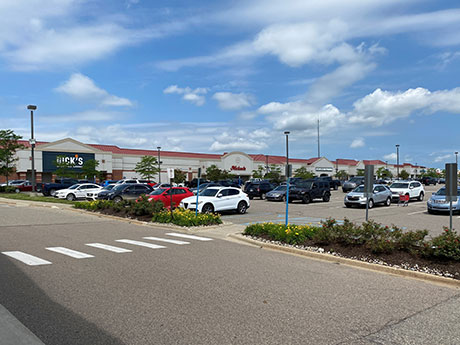By Evan Lyons, Encore Real Estate Investment Services
Looking back on 2022, it could be said that Detroit’s economic performance last year mirrored that of the city’s tenacious Detroit Lions’ football season. Both were mired in doubt, plagued by volatility and sustained by grit, yet beyond all expectation, when the clock ran down, both proved the naysayers wrong.
Just as the Lions surprised doubters by finishing their season at 9-8 and beating their divisional rivals, the Green Bay Packers, Detroit surpassed expectations by outpacing the national jobs growth rate of 5.8 percent at mid-year 2022 with a rate of 8.6 percent year-over-year. Gains in employment and wages are expected to continue over the next few years, according to a University of Michigan study.
The city bolstered its “offensive line” with new store openings and new construction throughout the urban core. Stadiums and parks were filled again, fueled by crowd-pleasing events and programing, including Belle Isle parks’ notorious, over-waxed giant slide, which went viral and gained infamy last year for catapulting riders who dared venture a ride.
Detroit also scored points in visits to leisure and hospitality establishments during the past 12 months. Visits increased by 50 percent from June 2021 to May 2022 compared with the same period a year earlier.
In the same way that Detroit Lions Coach Dan Campbell kicked off the year boasting about his high expectations for his team’s performance in the upcoming season on “Hard Knocks,” a popular HBO TV show that put the Lions grit in the spotlight, I described a similar outlook for Detroit’s leasing marketplace in a 2021 Detroit retail article in this publication. Indeed, retail leasing absorption was immense, as the region saw roughly 4 million square feet leased in 2021 and another 2.9 million square feet during 2022.
Like Jamaal Williams setting a franchise record for rushing touchdowns in one season, neighborhood centers led the charge in leasing with roughly 1.1 million square feet leased. Continued demand for properties in critical areas within the city has compressed vacancy rates to 5 percent, an all-time low for the Detroit area.
The playbook for metro Detroit’s suburban retailers, consumers, apartment dwellers and commercial investors is also shaping up. The biggest economic recovery across southeastern Michigan was concentrated in suburban areas such as Oakland County, which outperformed the urban core. Wage growth has been steady in the county and, as of February 2022, the county’s unemployment rate stood at 3.8 percent, down dramatically from the level of 19.7 percent it reached in May 2020.
Steven Bacall of West Bloomfield-based development firm Bacall Group has maintained an active pipeline of suburban retail projects.
He states, “despite any post-COVID ramifications and higher interest rates, we continue to see a positive trend in commercial development in the metro Detroit area. I think keeping up with evolving times is what’s most important. We’ve stuck to developing our core asset classes like a recent neighborhood retail development project in Clinton Township, a 13,000-square-foot strip retail site. Tenants include Dunkin’, Bank of America, John Smith Subs and AT&T. We’ve also adapted to stay competitive in new industries, like our Okemos project on Grand River, which will be a 100,000-square-foot self-storage and retail mix.”
We’ve seen steady growth in another strong Southeast marketplace, known to many as University of Michigan’s Ann Arbor. Ann Arbor saw retail rent rates increase roughly 2.4 percent over the past 12 months, with a barely changed but historically low vacancy rate of 3.7 percent.
Capital markets activity
Capital markets, though cooling off from 2021, have continued to thrive with the past 12 months’ sales volume at $861 million, well above the five-year average. Over the same period, cap rates for sales in metro Detroit were between 6 to 8 percent for 45 percent of all transactions. The higher cap rate environment offered in core and suburban markets attracted national investors. Of the more than 1,000 transactions posted, roughly 68 percent of purchases were from a national buyer with 31 percent completed by locals.
Just like the Lions forced the Packers to compete in their own back yard on New Year’s Day, the national interest in Michigan and Midwest markets has forced local buyers and investors to pay up, as purchase prices for both national and local buyers have intersected for the first time in roughly five years.
This competition from the national buyer pool will continue as investors chase demand yields above that of the debt markets, further bolstering investment sales propping up commercial asset pricing in Michigan.
According to CoStar, the top two investment sales firms completing transactions in Michigan were CBRE ($80 million) and Encore Real Estate Investment Services ($70 million).
The residential home sales marketplace fumbled significantly in 2022 as a result of the Federal Reserve rate hikes. Thankfully residents seeking new dwellings found coverage after an apartment building blitz, the majority of which opened their doors throughout the region. Area developers delivered 540 units over the past 12 months, accounting for 83 percent of the total units delivered in the past two years. Though annual rent growth has decelerated to 2.9 percent in recent months, down from the all-time high of 10 percent in early 2022, rents today are still 49.9 percent higher than they were 10 years ago.
Those developers considering the sale at occupancy are still in luck. Despite downward pressure on pricing caused by interest rate increases over the past 12 months, national demand for multifamily properties kept values at an average cap rate of 5 percent, essentially flat, yet still below the Detroit area average cap rate of 6.1 percent.
In summary, naysayers counted the Detroit Lions out this past season, only to see them roar back with vengeance. Looking forward, Detroit’s real estate speculators shouldn’t be surprised to see the same on the commercial investing side. With a strong backfield in place, there are lucrative deals yet to score in the city of Detroit and its suburbs for the astute and rookie real estate investor and developer.
Evan Lyons is a senior director with Encore Real Estate Investment Services. This article originally appeared in the February 2023 issue of Heartland Real Estate Business magazine.



